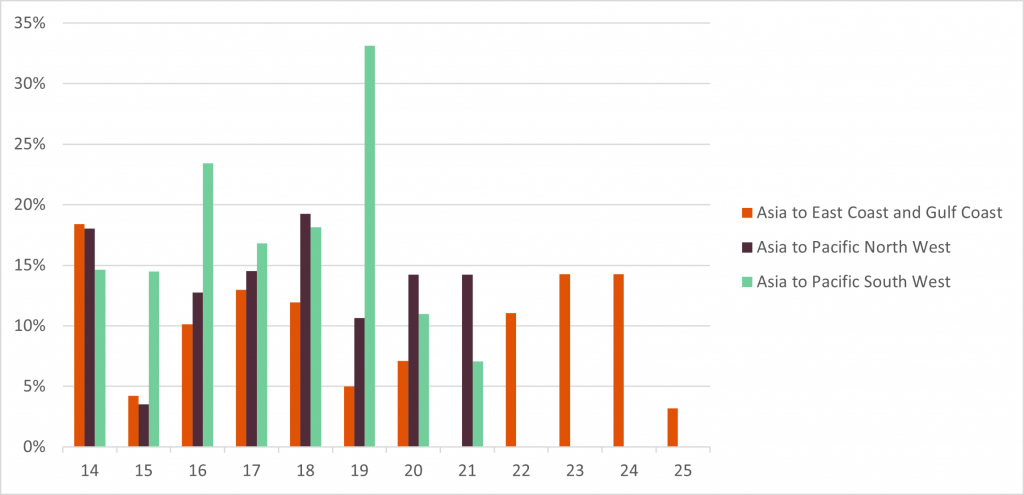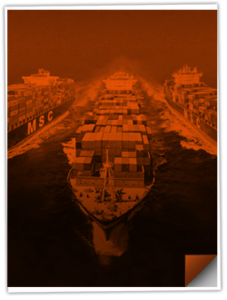Featured Headlines:
Insufficient Evidence Found to Designate Vietnam as a Currency Manipulator
Importers: Are You Utilizing ‘Best Practices’ during Container Inspections?
CIT Strikes Down Section 232 Tariffs on Steel and Aluminum ‘Derivatives’
Looking for a Supply Chain Partner to ‘Flash’ You?
Schedule Reliability Continues to Decline Globally (Yet Again!)
Time for an Airfreight Update!
Our Expert Shapinion - We Help You Get Your Ship Together
Insufficient Evidence Found to Designate Vietnam as a Currency Manipulator
In April, the Treasury Department released its semiannual Macroeconomic and Foreign Exchange Policies Report to Congress. This report provides a review of various events that occurred across the United States’ major trading partners over a 6-month period, such as relevant or impactful developments in international economic trade and/or global exchange rate policies.
The report’s analysis is guided by Section 3001 – 3006 of the Omnibus Trade and Competitiveness Act of 1988 (1988 Act) and Sections 701 – 702 of the Trade Facilitation and Trade Enforcement Act of 2015 (2015 Act).
In the report, the Treasury reviewed twenty (20) key U.S. trading partners with at least $40 billion worth of bilateral goods traded annually against the thresholds that were previously established in the 2015 Act. The Act included the following three (3) criteria:
- Persistent, one-sided intervention in the foreign exchange market occurs when net purchases of foreign currency are conducted repeatedly, in at least 6 out of 12 months, and these net purchases total at least 2% of an economy’s gross domestic product (GDP) over a 12-month period.
- A material current account surplus is one that is at least 2% of GDP over a 12-month period.
- A significant bilateral trade surplus with the United States is one that is at least $20 billion over a 12-month period.
Some of the other important findings released in the Vietnam report include, but are not limited to, the following points:
- Vietnam exceeded the Treasury thresholds for all 3 of the criteria under the 2015 Act, over the 4 quarters through December 2020.
- Treasury has commenced enhanced bilateral engagement with Vietnam and is working with Vietnamese authorities to develop a potential action plan to address the underlying causes of Vietnam’s currency undervaluation.
- In relation to the 1988 Act, Treasury has determined that there is insufficient evidence to make a finding that Vietnam had purposely manipulated the exchange rate between its currency and the US dollar to prevent effective balance of payment adjustments and/or gain an unfair competitive advantage in international trade.
According to Treasury officials, these findings may influence the ongoing Section 301 investigation into Vietnam’s practices related to currency valuation. However, it is unlikely that the U.S. will implement additional restrictions on Vietnam imports at this time.
Do you have questions related to Section 301 investigations?
We encourage you to reach out to [email protected] for additional assistance.
Importers: Are You Utilizing ‘Best Practices’ during Container Inspections?
Are you in the habit of performing a 7-Point Inspection with agriculture scrutiny on each container in an added effort to ensure due diligence and protection of the international supply chain?
If you answered no, then you may want to reconsider!
A well-seasoned importer knows the value and importance of exercising prudence by inspecting merchandise prior to loading. When completed cautiously and thoroughly, a pre-boarding assessment can certify the integrity of the container and verify that there are no hiding places for contraband within the container that may cause problems during transit.
To avoid future headaches on your shipment, we recommend observing the following ‘best practices’ while inspecting your container:
- Use a measuring device or string to ensure the correct size and that there are no false walls.
- Look for signs of visible pest contamination. Check for any animals, plants, insects, soil, manure, seeds, and/or like materials which may harbor invasive and destructive pests.
- Carefully review and document each of the below areas:
- Undercarriage check: Check to see that support beams are visible.
- Door check: Review interior/exterior doors to ensure any locking mechanisms are secure and in good working order; also, double check for signs of hidden compartments.
- Right side check: Conduct interior and exterior checks including structural beams and tap to ensure metal.
- Front wall check: Make sure blocks and vents are visible and appropriately spaced; check for signs of false walls or hidden compartments.
- Left side check: Conduct interior and exterior checks including structural beams and tap to ensure metal.
- Floor check: Ensure there are no clear signs of major damage or unusual repairs; check for uneven, step-up and/or false floors; and no signs of hidden compartments.
- Ceiling/roof check: Ensure there are no dents, holes, leaks, or signs of abnormalities to conceal hidden compartments
If you are crossing the border with any goods, then you will want to perform a 17-Point Inspection on your truck or trailer prior to transport.
Adhering to the above procedures may save you and your supply chain from time-consuming and expensive problems down the road. Performing container inspections is also considered a best practice of CTPAT (Customs Trade Partnership Against Terrorism) which can benefit future shipments as well!
Interested in learning more best practices that could positively impact your business? Contact a member of Shapiro’s Compliance Team for more information.
CIT Strikes Down Section 232 Tariffs on Steel and Aluminum ‘Derivatives’
Last month, the Court of International Trade (CIT) announced that it found that Donald Trump had violated his presidential authority when he expanded Section 232 tariffs on steel and aluminum derivative products back in January 2020.
The decision was announced following months of litigation resulting from a lawsuit filed by PrimeSource Building Products, a steel nail importer. The company alleged that Trump’s imposition of additional tariffs on derivatives occurred long after the 105-day deadline for tariff action originally imposed by the Commerce Department in 2018.
As a result, refunds will be granted to PrimeSource for any payments made towards the 25% steel derivative tariffs. This includes any entries of PrimeSource’s merchandise included in this litigation that liquidated with the assessment of 25% duties pursuant to Proclamation 9980. PrimeSource is entitled to reliquidation of those entries and a refund of any duties deposited or paid, with interest as provided by law.
Companies who import any of these steel and aluminum derivative products should consider taking legal action to avoid significant additional duties.
Please be aware that Commerce still has the chance to appeal CIT’s decision in a higher federal court. Therefore, importers with similar situations to PrimeSource may need to wait until the government makes its final decision before filing applications for refunds.
Please reach out to [email protected] with any questions.
Looking for a Supply Chain Partner to ‘Flash’ You?
In today’s constantly changing world, it can be tough to stay up to date on all the governmental changes and logistical challenges that may affect you and your business.
Lucky for you, Shapiro knows the value of a hot flash!
Sign-up via our Subscription Center to receive the latest urgent industry alerts that may affect your freight (for FREE…)!
Schedule Reliability Continues to Decline Globally (Yet Again!)
Following a record year of volume for international shipping, the Suez Canal debacle has now compounded and crippled an ‘EVER’–worsening vessel schedule reliability globally. In the latest development, carriers have announced a flurry of blank sailings.
According to officials, this change was necessary to retain accurate schedules in wake of the industry’s deteriorating conditions. One of the contributing factors to the decline is that vessels are becoming so delayed on their rotations that they cannot return to port in time for their next trip. Unfortunately, U.S. importers can expect the impending capacity reduction to worsen space constraints on the affected shipping lanes.
As we launch headfirst into May, here are the capacity reductions for Week 18 (please refer to the chart below for additional info):
- S. West Coasts (Los Angeles, Long Beach and Oakland): 18% capacity removed
- Pacific Northwest: 19% capacity removed
- S. East and Gulf Coasts: 12% capacity removed
Transpacific Capacity Adjustments: Weeks 14 to 25

How can Shapiro help? Should you require any assistance in successfully booking your cargo during this turbulent time, or additional information about current rates, please reach out to our Transportation team today.
Time for an Airfreight Update!
Here is a look at the major developments in airfreight over the past month:
- Turkish Airlines will begin providing real-time bookings through web cargo online booking platform.
- Virgin Air Cargo is increasing New York – London frequencies from 21 to 23 flights a week starting April 24th; they also cancelled 3 scheduled flights to Delhi and Mumbai due to India’s worsening COVID outbreak and will continue to monitor the situation.
- Air France will begin offering 3 services from Denver to Paris beginning July 2nd; they also increased screening fees – from 0.15/0.20 per kg – effective May 1st.
- United Cargo will be adding direct service from Newark to Dubrovnik, Dulles to Athens, and Chicago to Reykjavik beginning in July.
- Lufthansa joined other airlines in announcing an embargo on all VIVO products containing lithium batteries in light of the fire incident involving a pallet of VIVO products at Hong Kong Airport on April 11th; it also decreased fuel surcharges – from 0.35/0.30/kg – effective April 19th.
- Avianca revealed service disruptions and issues related to downgraded equipment (due to COVID restrictions) in Bogota; however, it expects to resume flights from Dulles to Bogota June 1st.
Our Expert Shapinion - We Help You Get Your Ship Together

The Physical Heart and the Spiritual Heart
With a heavy heart, I can say that in our heart of hearts we all know that our beloved ocean supply chain is very much a broken heart. Especially as we recover from Covid, the international transportation system is at least a ventricle, atrium, or aorta for the US economy (and almost certainly more).
Let’s take a peek at some concerning aspects of our heart health in 2021:
- Loaded containers are red blood cells; they oxygenate commerce with the rich hemoglobin of high-demand inventories. Transit time reliability is heartlessly miserable, and the delays start in the arteries of production and end in the veins of slow deliveries. We need to be able to replenish our oxygen-poor-inventories much faster to be healthy.
- Empty containers are white blood cells; their job is to be ready in a heartbeat when our supply chain is under attack. While briefly clogged, the empty container supply was blamed on Covid throughout 2020, but I think the steamship business needs to have a change of heart on empties. However, recent news on big purchases in this category warms my heart!
- The life blood of red blood containers means nothing when the health of US infrastructure amounts to pumping healthy blood into a very unhealthy body. We need to get to the heart of US port congestion, low trucker supply, and the endless heart attack of chassis availability and control.
- At the end of the day, the heart needs to pump a lot of blood efficiently and effectively. Yesterday’s paltry book of new vessel orders and the drying up of extra loader charter availability gets to the heart of the bigger picture supply dysfunction. This is a heart and soul issue, and shippers (including yours truly) must be ready to pay for instant access to the biggest white blood cells in all the land… quick and efficient access to scalable capacity. To do otherwise, is to risk dangerous economic anemia.
- We shippers and 3PLs conveniently let our heart skip a beat when we look at our history of steamship negotiations. Sure, the carriers have been screaming, “eat your heart out, market!!” for at least nine months now, but I would argue that most of us knew the pathway to unsustainable rates by heart for at least nine years! I’m not pulling any heartstrings here because the carriers have gone too far. Their heart of gold would seem to be one centered only on gold profits right now… even using demurrage and per diem as truly heartless profit centers during the largest supply chain heart attack on record.
We expect our doctors to find it in their hearts to evaluate our health through a very individual lens. When it comes to the physical and spiritual problems within today’s supply chain, we truly need to have multiple heart-to-heart meetings with all vested doctors and nurses along this complex system of life-giving economic nutrition. This needs to be open heart surgery with our internal teams, with truckers and warehouseman, with all types of carriers, and with the vital 3PL crew; we need to look closely at our individual hearts and souls as well.

Interested in reading more articles like this in the future? You can sign-up to receive the next edition of Supply Chain Reactions via our Subscription Center. (And did we mention it’s FREE?!)
Employee of the Month
As previously featured in Shap Talk, Shapiro has been sharing with you the names of employees who have been recognized for their exceptional efforts and contributions to our Company. At Shapiro, we continually work to develop, challenge, and inspire all of our employees to grow individually and with the Company.
This month, we would like to recognize TINA KARUNAN, IMPORT ANALYST.
Tina Karunan was nominated and recognized as Employee of the Month for her unwavering and unrelenting dedication to not only our customers, but to the entire Shapiro family as well. She constantly brings a great attitude to the workplace and to her fellow teammates. One of her coworkers went so far as to say, “If I could clone her, I would!” Anyone who is lucky enough to work with Tina knows that she is someone who lives, breathes, and truly embodies Shapiro’s core values – Customer Service, Integrity and Diligence – each and every day. Congratulations, and thank you, Tina!
We encourage you to provide us with employee feedback! Please email us at [email protected].



